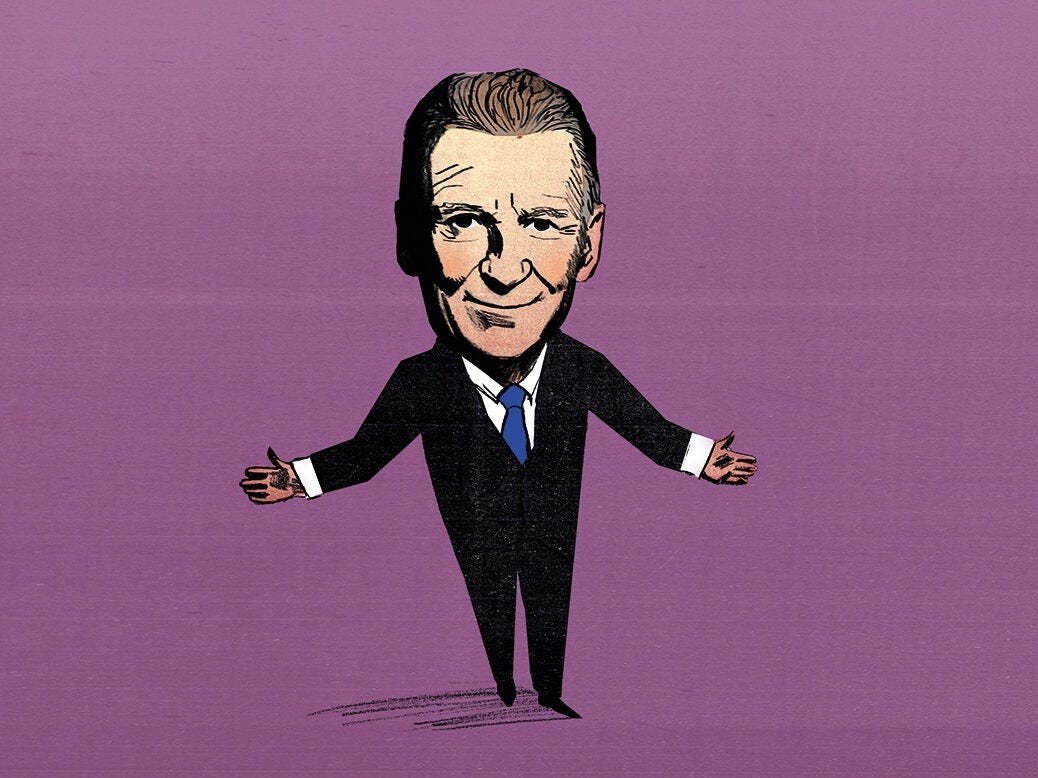Morning Call: Unrequited Gove
The government’s new definition of extremism is already giving Sunak headaches.
Good morning. The government’s new extremism definition has dropped. More below. Then, George speaks to GOD. Not that one. The former cabinet secretary, Gus O’Donnell.
Gavin has an interview with the economist and author of Capital in the Twenty-First Century, Thomas Piketty, which will be published in The Salvo newsletter here later today. Rachel Reeves won’t be happy with Piketty’s assessment of Labour:
There is a risk that Labour once again becomes too conservative on the economy. Control of the party has been taken by what I view as conservative approaches, which simply won’t work. Given the scale of the climate crisis, as well as the various social challenges and levels of public debt – the idea that you can confront these without major transformation of the fiscal system is just wrong. If the 20th century invented the income tax system, the 21st century will need to enact a progressive wealth tax system. What the Labour Party is currently advocating is far too conservative.
You can get the full Morning Call by clicking this button. We’d love to have you onboard!
Anti-Semitic cases rose by 147 per cent from 2022 to 2023 and anti-Muslim cases have risen by 335 per cent since 7 October last year. That is what the government says prompted it to announce a new definition of extremism. It is worth quoting in full:
“Extremism is the promotion or advancement of an ideology based on violence, hatred or intolerance, that aims to:
negate or destroy the fundamental rights and freedoms of others; or
undermine, overturn or replace the UK’s system of liberal parliamentary democracy and democratic rights; or
intentionally create a permissive environment for others to achieve the results in (1) or (2).”
The policy has been developed by the Communities Secretary Michael Gove – whose communitarianism often trumps his libertarianism – in order to prevent the government dealing with extremist groups by, for instance, giving them contracts or funding.
Many groups have come out to warn that the new definition represents a threat to freedom of speech. Jonathan Hall KC, who scrutinises the government’s state threat legislation, told the Guardian that the risk lies in how the definition “focuses on ideas, on ideology, not action”. The government will say it only affects those that deal with Whitehall. But Whitehall is an authority – it sets the tone and conveys legitimacy. It is not unthinkable that those who use labels to shut down opponents will add the new definition to their inventory.
In terms of politics, the government promising to clamp down on extremism in the same week that reports emerged of a Tory party donor calling for an MP to be shot is not ideal for No 10. The Prime Minister’s spokesperson would not say yesterday whether such comments undermined the UK’s liberal parliamentary democracy.
The problem with this is twofold. The government’s attempted crackdown on the rise in anti-Semitic and anti-Muslim abuse could be a threat to free speech – an issue the Conservative Party claims to pride itself on. Secondly, whatever political benefit Rishi Sunak may have been given by the new definition has been diluted by a charge that the Tory party is struggling to shake: hypocrisy.
Freddie’s picks
Sarah Manavis writes that feminism today is rehashing reductive, simplistic ideas from the 2010s.
David Gauke on why the rise of Reform is so dangerous for the Conservatives’ appeal to a dwindling pro-Leave electorate.
Quinn Slobodian looks back at the ten years since Thomas Piketty’s book Capital in the Twenty-First Century was published and asks whether, despite its popularity, it made any difference.
“The only card the Tories have left to play is the race card.” Diane Abbott asks why the Speaker did not call her during PMQs yesterday and criticises Labour’s own record on race (Guardian).
Uncover insights from Lowell’s Financial Vulnerability Index
An unprecedented third of UK adults now have less than £500 in emergency savings, leaving them alarmingly exposed to financial shocks. Delve into the latest insights, drawing on anonymised data from 9 million Lowell accounts to scrutinise the UK's financial resilience. Discover the findings here.
Gus O’Donnell: the insider’s guide to preparing for power
They used to call him “God”. For six years, from 2005 to 2011, Gus O’Donnell bestrode Whitehall as cabinet secretary, the UK’s highest-ranked civil servant. He served three prime ministers – Tony Blair, Gordon Brown and David Cameron – and oversaw the formation of Britain’s first coalition government since 1945. As the civil service prepares for a likely Labour administration, and as critics assail Whitehall as “the blob” and the “deep state”, there are few better placed to offer an insider’s perspective.
I met O’Donnell, a youthful 71, at the office of Frontier Economics, the consultancy he chairs, in Holborn, central London. He defies the caricature of the “man in Whitehall”: cut-glass accent, public school education, Oxford PPE degree. O’Donnell attended a Catholic grammar school, read economics at the University of Warwick (after retaking his initially “dreadful” A-levels) and speaks with the vowels of his native south London. The prime minister he was closest to was “the boy from Brixton”, John Major, whom he served as No 10 press secretary from 1990 to 1994.
Today, O’Donnell is refreshingly candid about the defects of British democracy. “If you look at the Economist Intelligence Unit’s index of democracies, we don’t come in the top ten; we don’t do well and you can understand why.
Click through to the NS to read the rest, or MC subscribers can read in full in-email.
Keep reading with a 7-day free trial
Subscribe to Morning Call to keep reading this post and get 7 days of free access to the full post archives.










